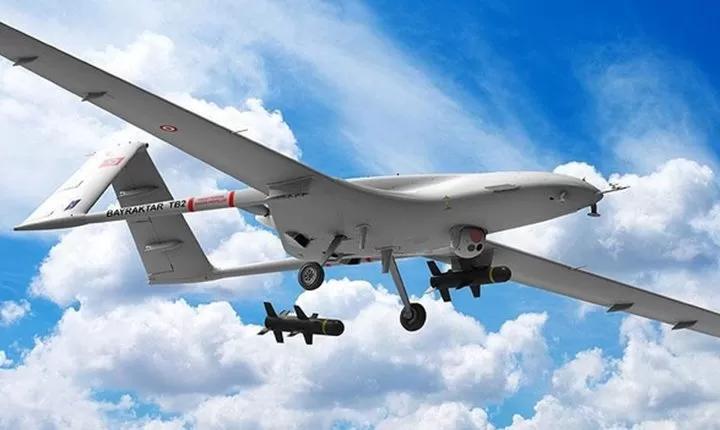"Be afraid, enemies! You will have no peace on our land!" This is how the Ukrainian Armed Forces tweeted, commenting on a video of the Turkish Bayraktar march destroying Russian tanks in the field.
Yalaf from Beirut: In a video clip that went viral on Twitter on Sunday evening, a massive explosion ripped through what appears to be a Russian convoy, hitting a surface-to-air missile system directly. The black and white footage, posted to the Armed Forces of Ukraine account, is one of several that have surfaced on social media in recent days showing the devastating impact of Ukrainian drone strikes on the Russian military machine. When the drone's payload explodes in the video - which appears to be a cellphone recording of a screen at a drone facility in Ukraine - people at the facility can be heard gasping in awe before bursting into cheers and applause.
"Be afraid, enemies! You will not have peace on our land!" wrote the Armed Forces of Ukraine in the caption of the video.
The star of this and other videos circulating on Twitter is the Bayraktar TB2, a type of Turkish drone that the Ukrainian military has increasingly deployed against Russian forces in recent days. The Ukrainian military said on Tuesday that Bayraktar drones destroyed one tank and two surface-to-air missile systems overnight. In other videos shared on Twitter, Bayraktar drones, which have been in use by the Ukrainian military since at least 2021, are shown blowing up what appears to be a Russian fuel convoy and a group of supply trucks.
These drones are small and lightweight, with a wingspan of 12 meters allowing them to stay in the sky for up to 30 hours at a time. Each drone can carry up to four laser-guided missiles, depending on the company that produces them.
Bayraktar's influence in Ukraine
Ukraine's drone campaign contributed to its early successes in slowing the Russian advance, and is exposing unexpected weaknesses on the part of the Russian military, US and European military analysts said. Perhaps most importantly, analysts add, the videos have also become an increasingly prominent part of Ukraine's information warfare — giving Russian invaders reason to fear their enemy, and providing a vital boost to Ukrainian morale amid fears of an upcoming military offensive. However, analysts point out that drones are unlikely to change the long-term course of the war.
The footage published by the Ukrainian army shows serious flaws in the Russian air defense cover, which is a surprise to many observers. The footage is also useful for public relations and psychological warfare,” says Arda Moldoglu, a Turkish military and aerospace analyst.

Reliable and accurate military drones have always been the domain of the US military. But the technology has become more popular in recent years, and is now a staple of many battlefields in the 21st century. Turkey is now the prominent supplier. In the past two years, Turkish Bayraktar drones have appeared not only in Ukraine, but also in Ethiopia, Azerbaijan, Libya and Syria. Last year in Ethiopia, a rebel force was attacking the capital, Addis Ababa, before the government repelled them with drones. In the conflict between Azerbaijan and Armenia in 2020, Turkish drones proved decisive in Azerbaijan's victory over Armenia, Russia's ally.
"In recent years, the Bayraktars have had some really famous successes," says Tony Osborne, London bureau chief for Aviation Week, a publication focusing on the aviation industry. "I would argue that it is now the most famous drone in the world."
The video released Sunday by the Armed Forces of Ukraine reveals one of the main strengths of drones: they are capable of inflicting disproportionate damage on enemy equipment, are much cheaper than other drones, and have low risks. Osborne estimates that the Bayraktar drones were sold to Ukraine at a cost of millions of dollars each — but that the Russian surface-to-air missile system destroyed in Sunday's video could be worth up to $50 million.
"The important thing about these things is that they're cheap," he says, "and when they're cheap, you're not worried about losing them. You can send them into combat and if they achieve dramatic success, as we saw yesterday, you'll suddenly win the war of attrition."
Osborne estimates that Ukraine likely has about 20 Bayraktar drones in its operational arsenal. Last December, Bloomberg reported that Ukraine had ordered twenty more planes.
Türkiye's growing role
For Turkey, a NATO member, drone sales to Ukraine are in line with its military interests, i.e. maintaining the balance of power in the Black Sea region, according to Galip Dalay, a specialist on Turkish and Middle Eastern politics at Chatham House.
While the Bayraktar drones are manufactured by a private company, Bayraktar Technologies, they are widely seen as an arm of Turkish foreign policy. The company's chief technology officer, Selcuk Bayraktar, is the son-in-law of Turkish President Recep Tayyip Erdogan. “Countries like the United States, China and Israel refused to sell armed drones to Ukraine,” Haluk Bayraktar, the company’s CEO and Selcuk’s brother, said during a webinar in May 2021. “Turkey was the only country that accepted Ukraine selling this technology.”
Turkish foreign policy has also revitalized the presence of Bayraktar drones in Syria, Libya and Azerbaijan, i.e. on all battlefields where Russian and Turkish proxies face each other. "Drones give Turkey a geopolitical advantage," says Dalay. "It's one thing to have conventional combat in places like Libya or Syria, but it's another to use drones. Drones make Turkey's job easier."
The Ukrainian military has almost certainly shared videos of Bayraktar drones ramming Russian convoys to boost morale. But with so many Russian vehicles pouring into Kiev, any Ukrainian morale arising from videos of drone strikes is likely to be short-lived.
Elaf prepared this report for the American magazine, Time